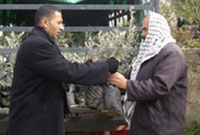
“Social impact is our entrepreneurship goal and this is also serving us from a business standpoint.”
Need I say more? That’s a nice definition of social enterprise.
The statement above is from Nasser Abufarha, 46, founder of several social enterprises that serve both the farmers of Palestine and those who want to support organic and fair-trade enterprises. In fact, as indicated in the statement above, the growing demand for fair-trade and organic products is part of his business plan.
“The business is based on social-impact goals, not necessarily profit maximizing. However, from the business perspective, much of the interest in our products is coming from socially responsible, environmentally responsible companies and communities,” Abufarha says. “So the more we can demonstrate the social impact of our product, the more valuable and more promoted our products become.”
In just 6 years, he has turned observations made while researching his doctoral dissertation into a growing, global social enterprise and answers a question I’ve asked before, “What Is a Social Entrepreneur?“
His doctoral research – he has PhD in Anthropology with a minor in International Development from the University of Wisconsin – resulted not just in a dissertation and a thriving business, but an improvement in the lives of thousands.
- His exporting business, Canaan Fair Trade, ships olive oil, soaps, nuts, sun-dried tomatoes, and more throughout the world.
- The products are produced by independent co-ops whose 1,700 members adhere to Fair Trade principles and whose numbers include women-owned co-ops.
- To help the farmers, Abufarha founded the Palestinian Fair Trade Association to set standards of quality and fairness, and provide workshops in product quality, organic farming, and fair-trade certification.
- The cost of Canaan products includes $1 for its Trees for Life program, which has planted about 50,000 olive trees throughout Palestine.
- The Canaan Scholarship fund supports youth activities from pre-college through college, including 10 full-ride, 4-year scholarships each year for the children of the PFTA farmers.
- After 10 years with Canaan, administrators can apply for a $100,000 interest-free loan with which to start their own social innovation project. To get the loan, they must identify a social problem and an entrepreneurial approach to fixing it, including a business plan.
Canaan Fair Trade and the PFTA exemplify not only the power of business skills when applied to social problems but also the benefits of social responsibility to small business owners.
It also shows that consumer demand can affect the whole supply line, all the way to the olive orchard in Palestine, a thought to keep in mind when shopping. Little things do mean a lot.
If you want to sample the benefits and find our more about how they did it, visit the Canaan booth at any of the many trade shows listed on its website, including NASFT Fancy Foods Show in New York City, June 27-29.
How do you think business can help solve social problems? Any examples?
Photo: © Palestine Fair Trade Association
